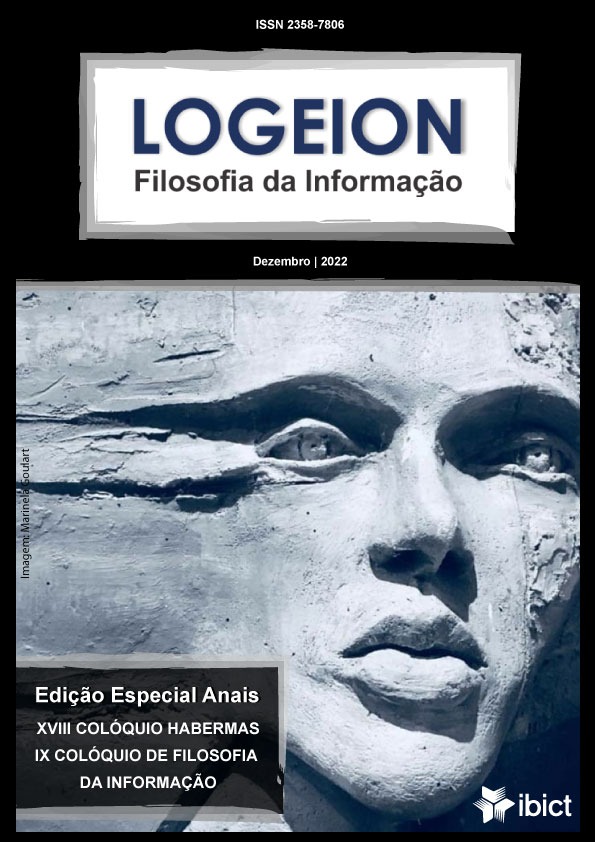The principle of universalization in Jürgen Habermas discursive theory
DOI:
https://doi.org/10.21728/logeion.2022v9nesp.p6-30Keywords:
Principle of Universalization. Moral. Right. Interests. Communicative PraxisAbstract
This scientific article is part of a research aimed at investigating the implications and interpretations arising from the transformation of the positioning of the principle of universalization (U) operated in the theory of discourse by the German philosopher Jürgen Habermas, especially from some of his works from the 1980s and 90. The cognitivist claim of discourse ethics grounds morality in the face of the possibility of rational discursive reconstruction of the justifications for norms. The universalization test is part of the rationale, but in what sense? In order to dispel skepticism regarding the pretense of practical justification, Habermas rethinks the Kantian relationship between morality and law. More precisely, in the face of complex societies marked by the Democratic State of Law and the use of practical discourses other than morality to justify social practices, the legitimacy of norms involves making explicit the discursive relationship between law, morality and politics. It is within the scope of this challenge that the German philosopher has been modifying the formulation and positioning of his principle of universalization (U) over time, as well as its relationship with the principle of discourse (D) and, later, with the principle of democracy (In). After going through this path, we launch the hypothesis, according to which, the emphasis that Habermas gives to the law in Facticity and Validity together with the repositioning of the moral point of view, allows to think in a dialogical way the social interaction as communicative praxis without subjects.
Downloads
References
AUSTIN, J. L. Quando Dizer é Fazer: palavras e ação. Porto Alegre: Artes Médicas, 1990.
BONDIA, Jorge Larrosa. Notas sobre a experiência e o saber de experiência. Revista Brasileira de Educação, Rio de Janeiro, ANPEd, n. 19, p. 20-28, Abr. 2002.
DUTRA, Delamar Volpato. A Reformulação Discursiva da Moral Kantiana. Porto Alegre:EDIPUCRS. 2002.
HABERMAS, Jürgen. Conhecimento e Interesse. São Paulo: Editora Unesp, 2014.
HABERMAS, Jürgen. Consciência Moral e Agir Comunicativo. Rio de Janeiro: Tempo Brasileiro, 1989.
HABERMAS, Jürgen. Vorstudien und Ergänzungen zur Theorie des Kommunikativen Handelns. Frankfurt am Main: Suhrkamp, 1984.
HABERMAS, Jürgen. Comentários à Ética do Discurso. Lisboa: Instituto Piaget, 1999.
HABERMAS, Jürgen. Direito e Democracia: entre facticidade e validade (v. I). Rio de Janeiro: Tempo Brasileiro, 2012.
HABERMAS, Jürgen. Direito e Democracia: entre facticidade e validade (v. II). Rio de Janeiro: Tempo Brasileiro, 2012.
HABERMAS, Jürgen. A Inclusão do Outro: estudos de teoria política. São Paulo: Edições Loyola, 2002.
HABERMAS, Jürgen. Entre Naturalismo e Religião: estudos filosóficos. Rio de Janeiro: Tempo Brasileiro, 2007.
HUME, David.Investigação sobre o entendimento humano e sobre os princípios da moral. Trad. José Oscar de Almeida Marques. São Paulo: Editora Unesp, 2004, p. 367.
HUME, David.História da Inglaterra Da invasão de Júlio César à Revolução de 1688. São Paulo: Editora Unesp, 2017
KANT, Immanuel. Fundamentação da Metafísica dos Costumes. Trad. Paulo Quintela.Lisboa: Edições 70, 2007.
KANT, Immanuel. A Metafísica dos Costumes. 3 Ed. Tradução. José Lamego. Lisboa: Calouste Gulbenkian, 2017, p.43.
MOUFFE, Chantal. Democracia, cidadania e a questão do pluralismo. In: Política e Sociedade – Revista de Sociologia Política, vol.1, n.3, Florianópolis: EDUFSC, 2003.
REPA, Luiz. Reconstrução e Emancipação: método e política em Jürgen Habermas. São Paulo: Editora Unesp, 2021.
ROUSSEAU, Jean-Jacques. O Contrato Social. In: Os Pensadores. Tradução de Lourdes Santos Machado. Vol. XXIV. São Paulo: Abril Cultural, 1973.
WEBER, Max. Economia e Sociedade: fundamentos da sociologia compreensiva.Trad. De Régis Barbosa e Karen Elsabe Barbosa. 4. ed. Brasília: Editora Universidade de Brasília, 2015, p.17.
WITTGENSTEIN, L. Investigações Filosóficas. Tradução: José Carlos Bruni. São Paulo: Editora Nova Cultural, 1999. (Coleção Os Pensadores: Wittgenstein)
Downloads
Published
Issue
Section
License
Copyright (c) 2023 Logeion: Filosofia da Informação

This work is licensed under a Creative Commons Attribution-NonCommercial-ShareAlike 4.0 International License.
The journal is published under the Creative Commons - Attribution - Noncommercial - Share Alike 3.0 Brazil.
The published work is considered collaboration and therefore the author will not receive any remuneration for this as well as anything will be charged in exchange for publication.
All texts are responsibility of the authors.
It’s allowed partial or total reproduction of the texts of the magazine since the source is cited.




